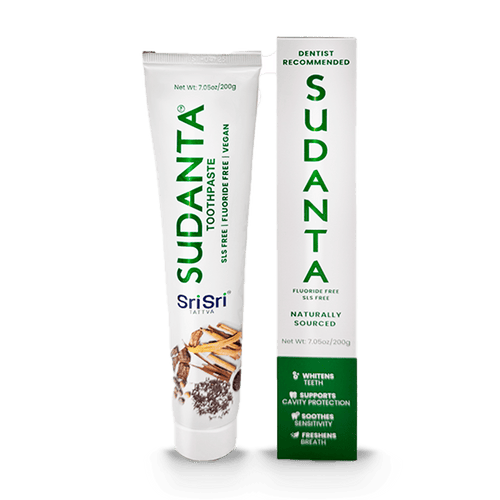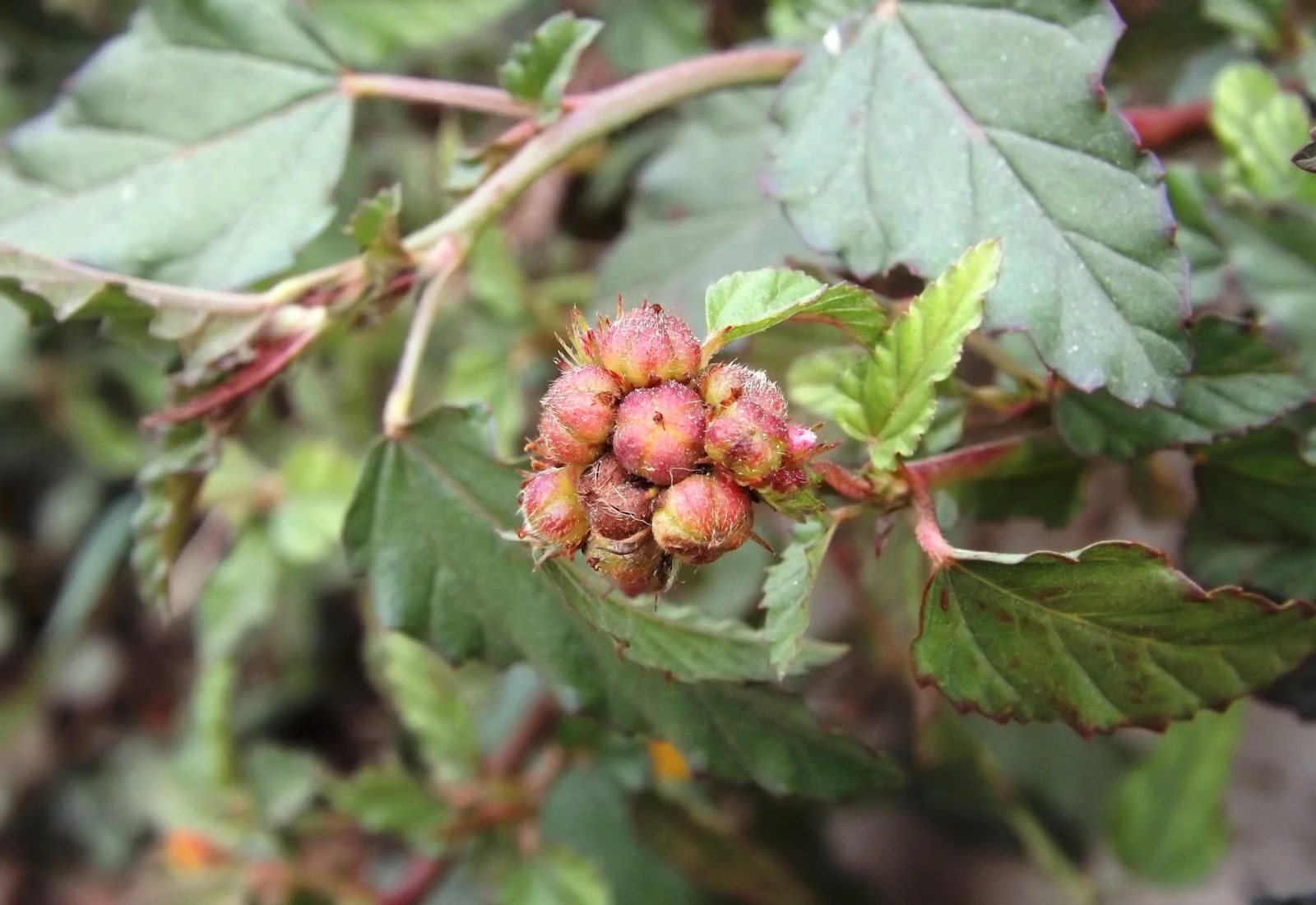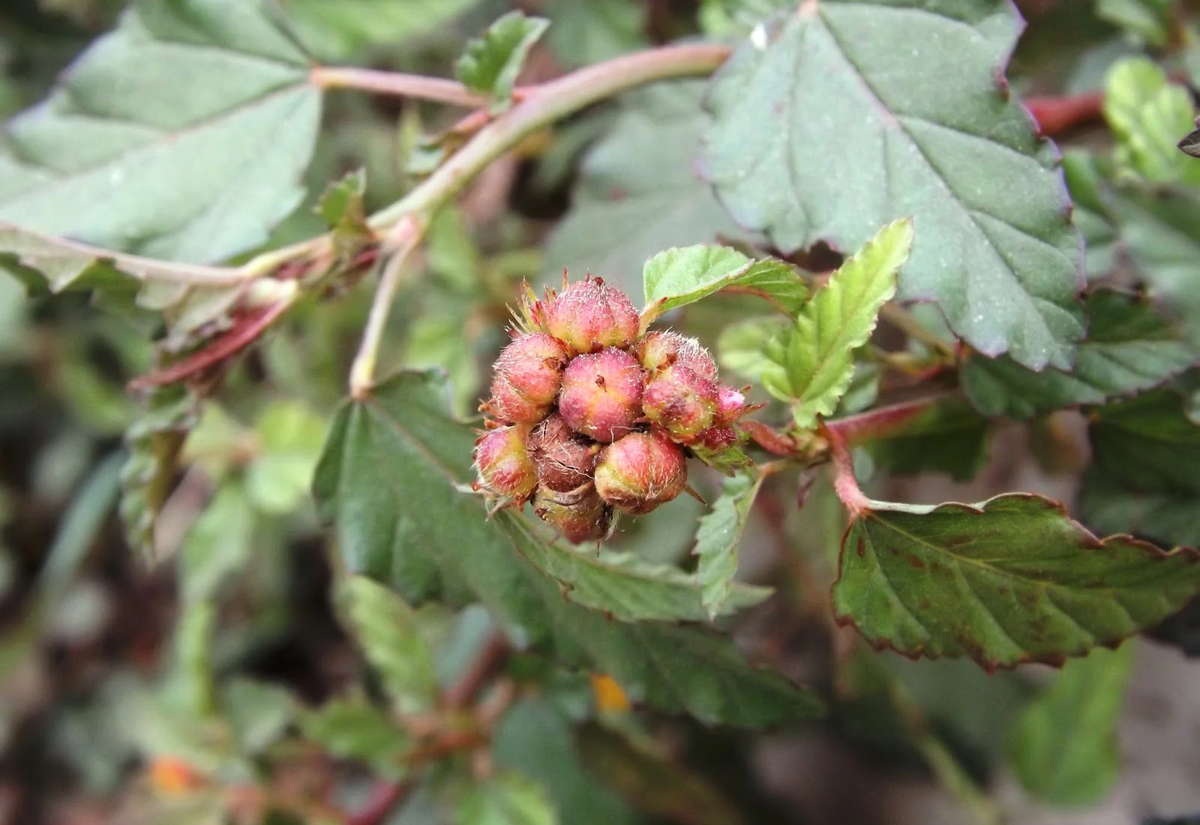Punarnava
Punarnava, native to India, is a medicinal herb in use for centuries in Ayurvedic medicine to treat a wide range of health conditions. It is known for its ability to improve kidney function, reduce inflammation, and promote healthy digestion.
Punarnava also contains different types of antioxidants, which can guard the body against oxidative stress and stop cellular damage. Punarnava is regarded as a Rasayana in Ayurveda, which means it is said to encourage longevity and aid in cell renewal. According to an extensive academic overview of the herb by Indian researchers from multiple institutes, the plant is frequently incorporated into remedies for a variety of illnesses, including liver disease, heart disease, respiratory issues, and skin diseases. To increase its therapeutic properties, it is frequently combined with other herbs.
While punarnava is generally considered safe, it is important to talk to an Ayurveda physician before using it, especially if you are pregnant, breastfeeding, or have any underlying health conditions.
Characteristics of the Punarnava Plant
Punarnava, scientifically referred to as Boerhaavia diffusa, is a perennial herb gracing tropical and subtropical regions across our planet. While its presence is acknowledged worldwide, it truly flourishes in the heartlands of Brazil, where it is affectionately known as "erva tostao." This botanical wonder finds its place in the Nyctaginaceae family, commonly known as the four o'clock family.
Physical characteristics of the Punarnava plant:
- Habit: Prostrate or ascending herb
- Height: Up to 1 meter tall
- Branches: Spreading
- Leaves: Small, thick, and fleshy; green and smooth on the top, pale pink and hairy on the under-side
- Roots: Large, tuberous, and yellow, brown, or grey
- Flowers: Small, pink, white, or pinkish-red flowers that are clustered together at the tips of the branches
- Fruit: A small, round, and dry fruit that contains a single seed
- Habitat: Punarnava grows in a variety of habitats, including wastelands, roadsides, and disturbed areas. It is tolerant to a wide range of soil and climatic conditions.

What are the synonyms of Punarnava?
Also known as Boerhavia diffusa, is a herb commonly found in tropical regions. However, there are several synonyms for punarnava that are used in different regions and cultures. It is known as "Raktakarabeej" which translates to "blood seed" in English. In Sanskrit, it is called "Shothaghni" which means "that which eliminates swelling". It is also known as "Thazhuthama" in Malayalam and "Mukkarattai" in Tamil. In Ayurvedic medicine, it is referred to as "Saraswatha" which means "restorer of vitality". It is commonly called "Hogweed" in English. The plant is also known as "Spreading Hogweed" or "Red Hogweed". In traditional Chinese medicine, it is called "Bai Mao Gen" which translates to "white wool root" in English.
Nutritional Value of Punarnava
Punarnava comes loaded with essential nutrients that support better health and wellness overall. Importantly, it has high potassium content which is a vital mineral that helps to regulate blood pressure, support proper muscle and nerve function, and maintain healthy heart function. Punarnava is also a rich source of vitamin C, a powerful antioxidant that helps to boost the immune system and protect the body against free radicals that can cause cell damage and chronic diseases. It reportedly has 5 amino acids (6 essential) in the whole plant and 14 amino acids (7 essential) in the roots along with isopalmitate acetate, behenic acid, arachidic acid (6.3%), and saturated fatty acids (38%)
Punarnava is also a great source of flavonoids and alkaloids, which are plant compounds that have anti-inflammatory and anti-cancer properties. These compounds help to reduce inflammation in the body, boost immunity, and fight off harmful pathogens. Punarnava also has been shown to have anti-diabetic properties.
Health Benefits of Punarnava
Punarnava is known for its diuretic properties, in other words, it helps remove excess fluids from the body, making it an effective treatment option for conditions like edema, where fluid accumulates in the body’s tissues. which is the accumulation of fluid in the body's tissues. The herb is also beneficial for people with kidney problems, as it helps to reduce swelling in the kidneys and improve their overall function. Punarnava is also known for its incredible anti-inflammatory property, making it an effective treatment for inflammatory conditions such as arthritis, gout, and other joint problems. The herb contains compounds that help to reduce inflammation in the body, which can help to relieve pain and improve mobility in affected joints. Punarnava is also known for hepatoprotective property, that is its ability to support the liver, which detoxifies the body by getting rid of the harmful toxins in the bloodstream.
Another health benefit of punarnava is its ability to boost the immune system, thanks to the compounds present in it that help strengthen the immune system and improve its ability to fight off infections and diseases.

Benefits for Gastrointestinal Diseases
One of the more significant benefits of Punarnava is its effectiveness in helping heal gastrointestinal diseases in the form of a Rasayana. It helps in the secretion of digestive juices, and as such improves digestion and reduces the risk of acid reflux. Punarnava’s anti-inflammatory properties also enable it to heal inflammatory bowel diseases such as ulcerative colitis and Crohn's disease. The herb contains compounds that have been shown to reduce inflammation in the gut and improve the overall health of the digestive system. Punarnava also has antimicrobial properties that can help to fight off harmful bacteria in the gut, reducing the risk of infections and other digestive disorders.
Punarnava also has a positive impact on the liver, when taken under an ayurveda physician’s advice. It helps in the regeneration of liver cells and improves liver function, which is crucial in the digestion and processing of nutrients. The herb also contains antioxidants that help to protect the liver from damage caused by toxins.
Benefits for Neuromuscular Disorders
Punarnava has been used for centuries to heal and soothe neuromuscular discomfort. Punarnava contains several active compounds that have been shown to have therapeutic effects on the nervous system, making it a promising natural treatment option. One of the key benefits of punarnava for neuromuscular disorders is its anti-inflammatory properties. Inflammation can cause damage to the nerves and muscles, worsening the symptoms of neuromuscular disorders. Punarnava contains flavonoids and alkaloids that have been shown to reduce inflammation and protect the nervous system from damage.
According to research, another benefit of punarnava is its ability to improve muscle strength and function. Punarnava has been found to improve deha bala or muscle performance, which can be beneficial for people with neuromuscular disorders that cause muscle weakness. Punarnava has also been found to have neuroprotective benefits, which can help to prevent further damage to the nervous system. Studies have shown that punarnava can help to protect the nerves from toxins and other harmful substances, reducing the risk of nerve damage and degeneration.
Benefits for Respiratory Diseases
A study published in the Journal of Ethnopharmacology found that the roots of punarnava possess bronchodilatory effects, which means it can support opening up the airways and ease breathing in people with asthma and bronchitis. It was also found that punarnava can reduce the production of mucus and inhibit the release of histamine, to fight cough and respiratory inflammation.
Another Nigerian study found Punarnava possesses antimicrobial properties, making it effective against infections that can cause respiratory diseases. In a study published in the Journal of Ayurveda and Integrative Medicine, punarnava was found to be effective in inhibiting the growth of Mycobacterium tuberculosis, the bacteria responsible for tuberculosis. This suggests that punarnava may be a useful adjunct therapy for the treatment of tuberculosis.
Punarnava is also known to have a diuretic effect, which can be beneficial for people with respiratory diseases such as pulmonary edema, a condition in which there is an accumulation of fluid in the lungs. By reducing the amount of fluid in the body, punarnava can help to improve breathing and reduce the risk of complications associated with respiratory diseases.
Benefits for Joints
Studies also suggest, Punarnava contains several active compounds that have anti-inflammatory properties, such as punarnavoside, rotenoids, and boeravinones that work to reduce inflammation and swelling in the joints, which can be especially beneficial for people with arthritis. Punarnava’s diuretic properties also supports joint health because by removing excess fluid which can put pressure on the joints, causing pain and discomfort. By reducing fluid retention, Punarnava can help relieve joint pain and improve mobility. Punarnava also contains antioxidants, which can help protect the joints from damage caused by free radicals.
Promotes Weight Loss:
This rejuvenating herb plays a pivotal role in combating excess fat. Its potent bioactive components work to thwart weight gain and reduce harmful cholesterol levels. Functioning as a gentle laxative, Punarnava benefits and aids in flushing out surplus fluids and toxins, thereby supporting healthy weight maintenance.
Manages Diabetes:
Punarnava benefits and boasts an exceptional hypoglycemic quality, proving highly beneficial in regulating blood sugar levels. This herb activates the production of insulin from the pancreatic cells, particularly the Beta cells. By curbing the breakdown of starch into glucose, it effectively prevents sudden spikes in blood sugar, contributing to better glycemic control.
Enhances Fertility and Libido:
It benefits both male and female fertility and libido. It improves sperm quality and testosterone levels in men regulates menstrual cycles and enhances ovulation in women. With potent aphrodisiac properties, it alleviates mental stress and stimulates reproductive hormone production in both genders. Regular consumption, especially of Punarnava powder, is associated with improved genital blood circulation, enhancing male libido and semen quality.
Good for Heart Health:
Punarnava demonstrates several heart-healthy properties crucial for addressing various cardiac issues. It has a calming effect on the cardiac system, beneficial for individuals dealing with arrhythmias and palpitations. Punarnava plant benefits the heart muscles, lowers cholesterol, and prevents lipid accumulation, reducing the risk of atherosclerosis, heart attacks, and other cardiovascular issues.

How to Use Punarnava?
You can purchase Punarnava in a variety of forms, including capsules, powders, and teas. Capsules are the most convenient option, as they allow you to easily take a controlled dose of the herb. Powders can be mixed with water or added to food, while teas are brewed by steeping the herb in hot water.
Does Punarnava have side effects?
When using Punarnava, it is important to follow the recommended dosage instructions prescribed by a certified Ayurveda physician. Taking in an excessive quantity can can lead to side effects such as stomach upset or dehydration. If you are pregnant or have a medical condition, it is important to talk to your doctor before using Punarnava.
Frequently Asked Questions
Is Punarnava Beneficial in Weight Loss?
Animal studies have shown, Punarnava can aid in weight loss by improving digestion and boosting metabolism. Being natural diuretic it can help in flushing out excess water and toxins from the body, leading to weight loss.
Is Punarnava used for Urinary Disorders?
Punarnava is a diuretic, which means it can help increase urine output, and flush out toxins from the body. This makes the herb an effective remedy for conditions such as urinary tract infections, kidney stones, and edema. Punarnava is also believed to have anti-inflammatory properties, which can help reduce inflammation in the urinary tract.
Can Punarnava be taken daily?
The answer to this lies in the recommendation of your Ayurveda physician.
Is Punarnava good for fatty liver?
Sompounds such as punarnavine and rotenoids that have been shown to have hepatoprotective (liver-protecting) properties. These compounds help to prevent liver damage by reducing oxidative stress and inflammation in the liver.
Is Punarnava an antibiotic?
Punarnava is not an antibiotic. It is a medicinal herb that has been used in Ayurvedic medicine for centuries.
Is punarnava good for blood pressure?
Punarnava has been found to be effective by some studies in lowering high blood pressure levels. Punarnava also contains compounds that have been shown to dilate blood vessels, thereby improving blood flow and reducing hypertension. Additionally, punarnava has antioxidant properties that protect the body against damage from free radicals, which can contribute to high blood pressure.
Does punarnava reduce protein in urine?
Proteinuria, or the presence of excess protein in urine, is a common symptom in kidney diseases. Punarnava is reported to work by promoting diuresis, or the increased production of urine, which can help flush out excess protein and other waste products from the body.
What is the source of Punarnava?
Punarnava (Boerhavia diffusa) is a plant that is native to tropical and subtropical regions around the world. It can be found in various countries, but it grows most abundantly in India and Brazil. The plant is a member of the four o'clock family (Nyctaginaceae).
Which Part Of The Punarnava Plant Helps Treat Eye Problems?
In traditional herbal medicine, Punarnava is often used for eye problems, and the leaves and roots of the Punarnava plant are typically used for this purpose. The powdered root is mixed with mamira (Thalictrum foliosum) to soothe the symptoms of eye disorders like corneal ulcers and night blindness. These plant parts are believed to have properties that can support eye health, however, consulting with your physician is a must to avoid any punarnava side effects.
Does Punarnava Treat Glaucoma?
In a study published in the journal Indian Journal of Ophthalmology, punarnava extract was found to be as effective as the prescription medication timolol in reducing IOP in patients with glaucoma.
Does Punarnava Treat Bronchial Asthma?
Punarnava has not been widely recognized as a primary treatment for bronchial asthma. The focus of organic Punarnava in traditional medicine is more on conditions like kidney and urinary tract issues. Bronchial asthma is a chronic respiratory condition that typically requires specific medications and treatments prescribed by a healthcare provider.
Can Punarnava Help Manage Ascites?
Punarnava is traditionally used in Ayurvedic medicine to help manage ascites, a condition characterized by an abnormal accumulation of fluid in the abdominal cavity. It is believed to have diuretic properties, which can assist in reducing fluid retention.
However, individuals with ascites should seek medical evaluation and treatment, and any use of Punarnava or other herbal remedies should be done under the guidance of a healthcare professional.
Sources:
https://www.ncbi.nlm.nih.gov/pmc/articles/PMC4053255/
https://www.ncbi.nlm.nih.gov/pmc/articles/PMC4649575/





